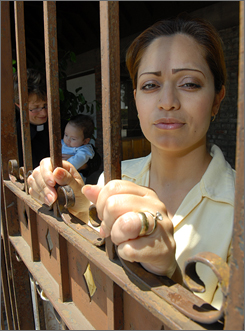Sometimes I get asked on who my favorite child is. Of course, we love our children equally. However, we do get misunderstood from time to time. Let me explain. As a parent of four children, when one of my kids is in pain or in crisis, it is not at all difficult for my wife and I to leave the other three children on their own for a time while we give special attention to our sick or suffering child. This special love and concern does not exclude our other children from our absolute love, but it does give priority to our sick child. As I meditate on what I understand of Jesus, it seems that He consistently gives high priority to those who are alienated and without much hope.
My impression of the story of God is that those on the sidelines are very much at the center of his love and concern. When I say this, there is often strong reaction to the idea that God could have some type of exclusive love for one group of people over another. Just as I am a father to my kids, the Bible tells us that God is our Father. John 3:16 tells us that God cares for all humanity. No exception. No favoritism.
I find it interesting that Jesus entered the world as a Galilean Jew. I think that is a deliberate act of God and it is significant. God chose not to incarnate himself among the religious leaders and political elite of Rome. Instead, he comes into the world on the fringe of Roman and Jewish existence. He is conceived in the womb of a teenage girl, Mary who is not yet married, which most likely created much hullabaloo in the village of Nazareth where she and her boyfriend resided. Like many urban young people today, they had to endure that scandal. To make life even more difficult, Joseph and Mary were forced to flee the comfort of their town with their son to a neighboring nation as immigrants to escape persecution and genocide. And, like most immigrants, they experienced not finding adequate housing in their time of transition and crisis.
If you are familiar with the stories of Jesus ministry in the Gospels, we see a constant concern with those pushed aside by the mainstream. The widow, the lame, the stranger, the poor and the rejected always seem to be the focal point of his encounters and ministry focus. What I find very interesting is when he does minister to the rich and powerful, like Zacchaeus, he seems to point them toward a redemptive opportunity that includes making things right with the poor as an expression of true follower of Jesus. Remember in John 3:17, it says that God sent Jesus not to condemn the world of its sins but to save it. His focus was that of redemption and salvation, never condemnation. Did you know that Jesus also sends us into the world to make disciples? We are never to condemn but to take part in God’s work of saving and discipling.
His teaching and parables also put great emphasis on a right understanding of the kingdom in relationship to those who are on the margins of society. When you throw a social event or a party, Jesus said, do not do it like the majority of people in society, who only invite those who will return the favor. Instead, when you organize and plan a sumptuous banquet, invite the outsider, the stranger, the weak, the broken, and the scandalously sinful who do not normally get invited to such affairs. The kingdom of God is like that kind of party, Jesus says. This is easy to say. I can only speak to myself and ask, “Do I do this?”
 In teaching his disciples what his kind of love is, Jesus tells the story of a man beaten and broken by the side of the road who is neglected by the religious folks but shown love, kindness and mercy by an outsider who is the one that demonstrates what it really means to love our neighbor. For Jesus, walking by and ignoring a needy individual is NOT AN OPTION for anyone who claims to be in relationship with his Father.
In teaching his disciples what his kind of love is, Jesus tells the story of a man beaten and broken by the side of the road who is neglected by the religious folks but shown love, kindness and mercy by an outsider who is the one that demonstrates what it really means to love our neighbor. For Jesus, walking by and ignoring a needy individual is NOT AN OPTION for anyone who claims to be in relationship with his Father.
In Matthew 25, Jesus makes a radical statement: when we minister to the neglected, rejected, and abandoned individuals we in fact minister to Jesus himself. The Bible reminds us that Jesus was crucified outside the city gates of Jerusalem, in a place called Golgotha, the place where criminals and thieves were executed for their crimes. He lays down his sinless life for the deliverance of the entire world in this unloved and detested place on the margins of both religious and political power and respectability. The significance of this is startling when we consider how Jesus lays down not only his life but his reputation. God allows his only begotten Son to be murdered and crucified alongside criminals, so that everyone in the human race would understand that no one is beyond redemption, or inclusion, in his kingdom.
When I reflect on the last hours of Jesus’ life before his crucifixion, what stands out is the way he was insulted and mocked by the crowds. The Bible says that they hurled all sorts of terrible insults at him (Luke 22:65 NLT).
 There are groups in our society who are looked down and rejected. I also understand that some may be called undocumented immigrants. This issue is growing in this country. Yes, there are laws and many of them have broken the immigration laws. Where is the heart of Jesus in this? Does Jesus care for the strangers (undocumented immigrants today)? Does he care for the poor and homeless?
There are groups in our society who are looked down and rejected. I also understand that some may be called undocumented immigrants. This issue is growing in this country. Yes, there are laws and many of them have broken the immigration laws. Where is the heart of Jesus in this? Does Jesus care for the strangers (undocumented immigrants today)? Does he care for the poor and homeless?
As a former immigrant and now a US citizen, I do believe in upholding the law. I believe that laws governing immigration should be followed. If the laws are found harsh or without compassion, then it is the duty of Congress to change the laws.
 However, it saddens me to hear of prejudice and insults imposed against the men, women, and children who, yes, have broken laws to be in this country, but, who have also been hired, used, and often abused by employers and our economic system in need of cheap labor. Because of their vulnerable status, it has become common to scapegoat and hurl insults at them without regard to the fact that they are human beings created in the image of God. What has been most shocking is when these types of insults have been made by those claiming to be followers of Christ. Religious people put more weight on the legality of immigration laws over the grace of Jesus. Will Jesus accept the strangers to church? Will Jesus call on the Roman authorities to arrest the strangers during his time?
However, it saddens me to hear of prejudice and insults imposed against the men, women, and children who, yes, have broken laws to be in this country, but, who have also been hired, used, and often abused by employers and our economic system in need of cheap labor. Because of their vulnerable status, it has become common to scapegoat and hurl insults at them without regard to the fact that they are human beings created in the image of God. What has been most shocking is when these types of insults have been made by those claiming to be followers of Christ. Religious people put more weight on the legality of immigration laws over the grace of Jesus. Will Jesus accept the strangers to church? Will Jesus call on the Roman authorities to arrest the strangers during his time?
In Jesus’ false conviction, beating, suffering, enduring of all kinds insults, and in his brutal death, everyone would see that his forgiving grace is for all, and that redemption is offered to all, regardless of the severity of our past trespasses or sinfulness.
So, when we speak about God’s love for the stranger, it is not a conversation that is based on any one particular verse pulled randomly from an ancient text, but a striking truth that is rooted in the entire revelation of God’s redemptive and saving activity that culminates on the cross. This indeed is Good News to the poor, the strangers (immigrants) and to all believers redeemed by the radical and unconditional love of Jesus.
